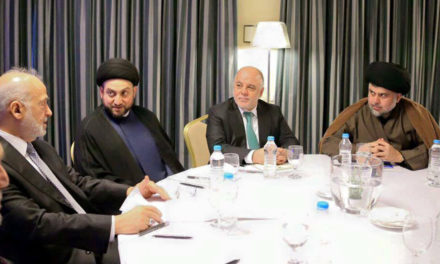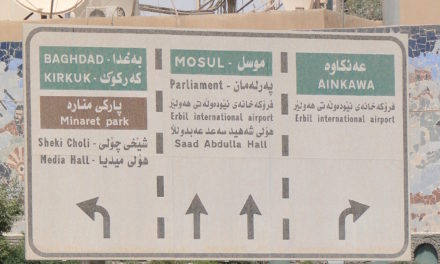The Iraqi prime minister-designate Adil Abdul-Mahdi was asked by the new Iraqi president Barham Salih to form the government on October 2 within 30 days according to article 76/second of Iraq’s constitution. This time Abdul-Mahdi is struggling to pave the way for an exceptional phase in Iraq’s history. He dreams about establishing different conditions through which he can rectify the lack of balance in the functioning of the state. These requirements are essential to amend the post-2003 experience and sustain the positive aspects of it.
From the beginning, Abdul-Mahdi wanted to break free from the control of the Iraqi political parties. He called on people to apply for ministerial posts via a website. Till now, more than 36,000 citizens have been registered as independent candidates. Abdul-Mahdi tried, as it is thought, to hold politicians in check by showing them that he has another choice: technocrats who can manage governmental institutions in a professional and less politicized manner. Some sources confirmed that Abdul-Mahdi would choose some of those independent candidates to establish a government not dominated by partisan leaders. In his thinking, this is the first step on the long road to change the nature of the political system that has ruled Iraq since 2003.
Abdul-Mahdi also desired to narrow the gap between the federal legislature and the executive branch. He is now trying to open an office in the Iraqi parliament to have a direct contact with the peoples’ representatives. This will allow bypassing many unnecessary administrative structures exploited by political parties. Abdul-Mahdi believes that such a strategy can restrain the extension of these parties in the formal institutions. If he succeeds in this aspiration, he will compel many parties to change their ways in doing politics. Certainly, this could be an important step that would help him and his successor to restore the prestige of the Iraqi state.
Abdul-Mahdi also seeks the eradication of the deep state. He has many times reiterated that parliamentarians will not be allowed to nominate themselves for ministerial posts. In addition to that, he attempts to exclude the traditional class on which parties rely to control the state. It includes director generals and heads of departments who constitute most of the partisan governmental machinery that has slowed down the functioning of the state. However, this will place him in a personal confrontation with all the influential political parties that have been part of the Iraqi state since 2003 and which have divided the important administrative posts between themselves. The big question now is whether he will be able to encounter this enormous challenge.
Abdul-Mahdi knows that he must have priorities. The first one is having an integrated governmental program that can be offered to the communities to meet its demands and to reduce its fears. The Shia blocs of Sairoon and Fatih, who supported Abdul-Mahdi as prime minister, have affirmed that they will give him one to two years in order to assess his performance. If he fails, they have vowed to overthrow him. Thus, he understands that he must prepare a good program to overcome this obstacle. Abdul-Mahdi recognizes that parliament will also vote on his program to decide the legitimacy of his political order.
The second priority is imposing criteria on the partisan candidates for governmental officials, including these norms: competence, honesty, courage, and clean and professional history. Here, he sought to assure people that he does not care about the names of nominees as much as he considers these standards. Political parties will, therefore, be required to present their best people. This might result in ending the discussion of whether this cabinet will be formed by the independent or partisan technocrats.
It also appears that Abdul-Mahdi is calmly attempting to neglect the faults and corruption of his predecessors. Many observers have affirmed that Abdul-Mahdi does not like to open fire on previous officials, as he is sure that he cannot bring most of them to justice. Thus, he has hinted that he would apply decisive procedures to counter corruption only for the coming years. This will anger Muqtada Al-Sadr, his supporter, who is looking to put officials like former prime minister Nouri Al-Maliki in jail. This is another controversial issue that Abdul-Mahdi will have to tackle pragmatically. Contrarily, he will suffer from huge pressure.
Concerning his relations with the Kurds, Abdul-Mahdi has now a vital advantage: the Kurdish divide. The rift between the Kurdistan Democratic Party (KDP) and the Patriotic Union of Kurdistan (PUK) is big. The former accused the latter of being responsible for losing Kurdish control over the oil-rich city of Kirkuk. The PUK claimed that the KDP was behind that blow as a result of its failed bid in holding the independence referendum last year.
Consequently, they presently do not have a common program towards the federal government. This will weaken their negotiation position in Baghdad, which will be more close to the PUK as long as it did not welcome the sessional step. Hence, it is expected that Abdul-Mahdi will reach a compromise with them on many debatable points: their share in the federal budget, the salaries of the Kurdish fighters, and the export of oil and gas. If this happens, Abdul-Mahdi will establish new principles in the relationships between Baghdad and Erbil.
In summary, all these terms that Abdul-Mahdi has insisted on can be, before anything else, his raft to deal with the pressure of political parties. Otherwise, he will not be able to overcome the outcomes he has inherited from the previous governments. No matter the results of his failure, political parties must work harmoniously to protect and reform the political system. Therefore, they have no other option but supporting Abdul-Mahdi with the hope that he will commit to these conditions in order to generate a stable future for Iraqis.

Diyari Salih
Diyari Salih is an Iraqi academic with a PhD in Political Geography, Baghdad and a Post-Doctorate in International Relations, Warsaw, focusing on geopolitical issues in Iraq.










